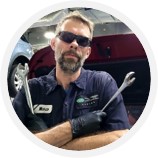Everyone loves to talk about how we can fix the national technician shortage, but few people are asking the individuals who can truly give us the answer: the technicians themselves.
We recently asked technicians: What is the one thing that needs to change to improve the technician shortage?
Obviously, it’s not one thing that needs to change, but we wanted to find out what changes technicians felt would be the most impactful on the shortage.
Check out what they had to say below.
Public Perception
“The one thing that needs to change: Public perception. As long as college degrees keep being glorified and no attention is given to the importance of technicians, we’re fighting a losing battle.”
Marco J Zwanenburg
Automotive Technician, Naples Luxury Imports
Connect on LinkedIn
“Mindset. Parents, mentors, and young. People must shake the antiquated notion that (a) the trades are for folks that can’t go to college, and (b) being a tradesperson only requires knowing how to wield a few cumbersome tools. I graduated from a 4 year university and (after an 8 year stint as a Marine Officer) chose to become a diesel technician. This job NEEDS highly intelligent, resourceful, driven, and critical-thinking individuals. It is not LESS THAN.”
Matthew Seglem
Mobile Diesel Technician, Diesel Werk NBTX
Connect on LinkedIn
“I’m going to come out and just say it… This problem needed to be addressed 20 years ago. In order to get people interested in this industry, it needs to come from their family’s upbringing. Most of these young people aren’t introduced to auto repair and have no interest in vehicles like we did growing up. With limited schools and households pushing kids into this industry, it’s going to be very difficult getting them interested in becoming a technician. Ask any old school mechanic why they became a mechanic… It wasn’t for the money—they did it because they love cars and working on them. Vehicles aren’t designed to be worked on by the average “Joe/Jane” anymore, so opportunities to work on them in your driveway aren’t there like it used to be.”
Dale Techel
Head Auto Technician, Rey’s Automotive & Tire
Connect on LinkedIn
Focus on Younger Generations
“We need to motivate young people by showing them the positives of our trade. Automotive careers provide challenges on many levels—overcoming these challenges can be very rewarding. Our trade is important, versatile, fulfilling, and most of all, just awesome! If we manage to inspire others, the shortage will soon be something of the past.”
Danny Versluis
Vehicle Systems Expert, DiagnoseDan TSB / DiagnoseDan on YouTube
Connect on LinkedIn
“Competitive pay and add vocational class opportunities to public schools/community. I was planning to be a mechanical engineer when I was in middle school. Having the class opportunity in high school helped me realize how much I enjoyed working with my hands, so I became a technician instead. Classes were quicker and cheaper than 4 years at university.”
Mario Canela
Automotive Technician, BMW of San Antonio
Connect on LinkedIn
“Kids aren’t out in the garage at home building engines with their dad. Working on vehicles all the time. I lived and breathed automotive from the time I was 2. Family raced cars. I was successful at go-kart racing and stock car racing. By and large kids are not doing these things anymore.”
Bradley Sims,
Owner & ASE Master Certified Automotive Technician, Sims Automotive
Connect on LinkedIn
Compensation
“Pay plans. Overall technician pay plans need to improve to reflect skill level and working conditions, regardless of whether a tech is seasoned or entry level. Seasoned techs need to be properly compensated and entry level techs need to be incentivized to join and stay in an industry that requires a substantial investment in tooling.”
Craig Tomczyk
Auto/Diesel Technician, First Vehicle Services
Connect on LinkedIn
“Compensation. This is not a quick fix. This requires both technicians themselves to hold to a higher tier of work and diagnostics, and the industry to recognize the distinction and compensate fairly.”
Josh Arnold
Master Technician, Toyota of Corvallis
“The flat rate pay plan discourages many technicians, especially new technicians with limited experience. In my opinion, flat rate is a cover up for poor business practices, poor management, and lack of repeat customers.”
Quentin Law
Service Technician, Checkered Flag
Connect on LinkedIn
“In my opinion as a diagnostic technician, the #1 thing that needs to change is the way that ALL technicians are paid to perform diagnostics. There is no “time to beat” here. Rushing diagnostics and giving away free diagnostics is helping no one. Us that truly can diagnose deserve to get paid, and the shop deserves to get paid. Plain and simple.”
Jamie Overby
L1 Master Automotive Technician, RPM Car Care
Connect on LinkedIn
“The technicians at the dealership level are the only employees that are flat rate. That alone is a problem because no one else is going to be efficient enough or work as hard as the tech does. Now, with brands pushing video walk-arounds (no labor op, this is of course on techs time), pictures, videos of concerns (again no labor ops for such). Flat rate will need to have an incentive to be flat rate. Right now, it is not beneficial to be flat rate unless corners are cut (unfortunately). With the electric market now, this will only make things worse for flat rate.”
Mario Borrelli
Shop Foreman, Pittsburgh Porsche
Connect on LinkedIn
Career Paths & Work Environment
“To improve the technician shortage, the industry needs to spend more time and effort on the new techs. We don’t have the option of sink or swim than move on to the next application anymore. If a person has made the decision to join this industry, they’re obviously interested and worth the effort. Don’t let them fail by giving them the support they need. We are all looking for a quick fix for this issue but needing a long-term solution. I feel by cultivating the talent we already have and keeping them from leaving the industry is a good place to start.”
Jason Olinger
Automotive Technician, Gwatney Chevrolet
Follow on TikTok
“I believe one thing that can help with the technician shortage is helping the staff you have gain knowledge to move up in the shop. Oftentimes ambition is right there in the line bay, and shops feel that it’s too much time and effort to train them for more. It’s much easier to replace entry level people than line technicians. One of the largest mistakes a lot of shops make is overlooking line techs until they lose them to other shops or even lose them from the industry altogether.”
Zach Espinosa
Automotive Technician, Dolan Toyota
Connect on LinkedIn
“Personalize the employment experience for each technician by ensuring everything the individual needs to succeed in our industry is contained within or has access through the working environment.”
Joshua Taylor
Founder, Wrench Turners & Owner, Just Work Hard Consulting Company
Connect on LinkedIn
“If it was as easy as one thing… I feel the only possible single answer is this: Give people the ability to make long-term plans. Of course, that can be quite a generic statement, but it is also accurate at the same time. It encompasses what we need to do as a field, involving career pathing, compensation, benefits, training, etc.”
Matt Fanslow
Diagnostic Technician/Shop Manager, Riverside Automotive
Connect on LinkedIn
“We lose half of our apprentices within the first year. We need to improve our onboarding processes. We also need to make a serious commitment to mentorship.”
Marshall Sheldon
Journeyman Mobile Diesel Technician, Murphy-Hoffman Company
Connect on LinkedIn
Diversity, Leadership, & More
“Making a better and more comfortable work environment for women to come into the industry. We need them to help fill the shortage.”
Shawn Rutherford
Master Mechanic, Adams 12 Five Star Schools
Connect on LinkedIn
“We need leaders. We have a bunch of managers who know how to read charts and graphs, but don’t listen to their people, don’t pay attention to the festering problems, and mistreat the people who work for them. Short term pay is more important to them than long term solutions. Until we change that, until we start working together as a team, nothing is going to change.”
Russell Wickham
Technician, Country II
Connect on LinkedIn
























